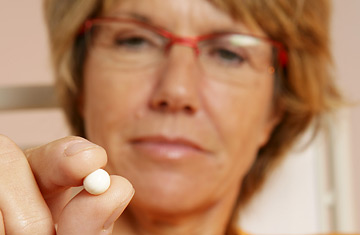
Progesterone in tablet form, used in hormone replacement therapy.
(2 of 2)
The reason for that, researchers speculate, could be related to two things. One, it could simply reflect the aging of the arteries; younger women are more likely to have flexible, pliable arteries that respond to estrogen, which tends to discourage plaque formation. Older arteries, on the other hand, are more likely to be stiffer, and already burdened with fatty deposits and plaques; in the presence of these plaques, it turns out, estrogen may even have the reverse effect, causing them to destabilize and rupture, leading to blocked-up arteries and a heart attack.
Or, some doctors believe, there may be a window of opportunity where hormone therapy should be started. The whole idea behind estrogen and progestin therapy after menopause is for the supplemental hormones to replace the estrogen that the woman's body is no longer making. If hormone therapy starts while the naturally circulating estrogen is still around, some doctors think that the hormones will continue to exert beneficial effects on the heart. The latest study seems to support this idea.
Still, even if estrogen is linked to less plaque in the arteries, that doesn't mean it outweighs other possible risks of hormone therapy. "People want a simple answer to whether estrogen is bad or good," says Marcia Stefanick, another author of the paper, from Stanford University. "but it's not that simple. We need to ask instead, 'Is it bad or good for what?'"
To get more answers, researchers are taking a closer look at the youngest post-menopausal population — women between 50 and 59 who are most in need of hormone therapy to relieve menopausal symptoms. Already, they are finding that the way estrogen is delivered can make a difference: the patch form of the hormone combination leads to fewer clots than the pill form, since the liver is not engaged as intensely in processing the estrogen when it comes through the mouth, and does not produce as many clotting factors with the skin-based estrogen. "Hormone therapy is an evolving story, and it's a very intriguing mystery that we don't understand yet," says Stefanick. "We don't have all the answers, but we're trying to get those answers now." So stay tuned. There will be more studies on hormone therapy, but at least they're starting to fit together and make sense.
